Anime Review: Hitori Bocchi no Marumaru Seikatsu
- Jul 13, 2019
- 8 min read

Alternative Names: Hitoribocchi no Marumaru Seikatsu, Hotori Bocchi's ○○ Life, The ○○ Life of Being Alone
Score: 7/10, 5/5
Length: 12 Episodes
Genre: Moe, Comedy, School Life, Slice of Life
Summary: Hitori Bocchi is a young girl who suffers from social anxiety so extreme that undergoes bouts of nausea every time she's put on the spot. Despite having the heart of a flea and the temperament of a mouse, Hitori has managed to have at least one friend for most of her life, the similarly socially impaired Yawara Kai. Yet, just as these best friends graduate grade school tragedy strikes. As if it weren't bad enough that they're going to separate high schools, Kai has decided to throw down a cruel but necessary ultimatum. Namely, she has sworn that they can't be friends again until Hitori has become friends with everyone in her class. Needless to say, this is going to be a tough first year for the weak and timid Hitori Bocchi.
Review: Despite my love for their cutesy aesthetic and laid-back tone, I've lately found myself agreeing with the general complaint most people level against the moe genre. While some go so far as to call it "boring," I personally attribute many people's disinterest to a simple lack of novelty or relevance to most people's lives. If you've sees one moe title, you've more or less seen every moe title. Though there are little deviations in the formula here and there to suit whatever the core premise happens to be this time around, nothing ever really changes. There are hardly any stakes the characters need to contend with. Most dramatic situations end well for everyone involved. And, of course, the shows often spend so much time making the characters look cute that they fail to flesh them out as actual characters--hence the term "moeblob." Now, while these criticisms certainly apply to Hitoribocchi, I'm personally inclined to argue that this series is a step up from your usual moe fare. On top of having characters with relatable problems, albeit ones that are exaggerated for comedic effect, it also manages to maintain a reasonable tonal balance between down-to-earth realism and the saccharine clouds most moe titles call home. So, while it certainly isn't going to win any awards for being a masterpiece among moe titles, it at least deserves some recognition for making the most of the formula, turning that fluffy goodness toward something I actually relate to and care about.
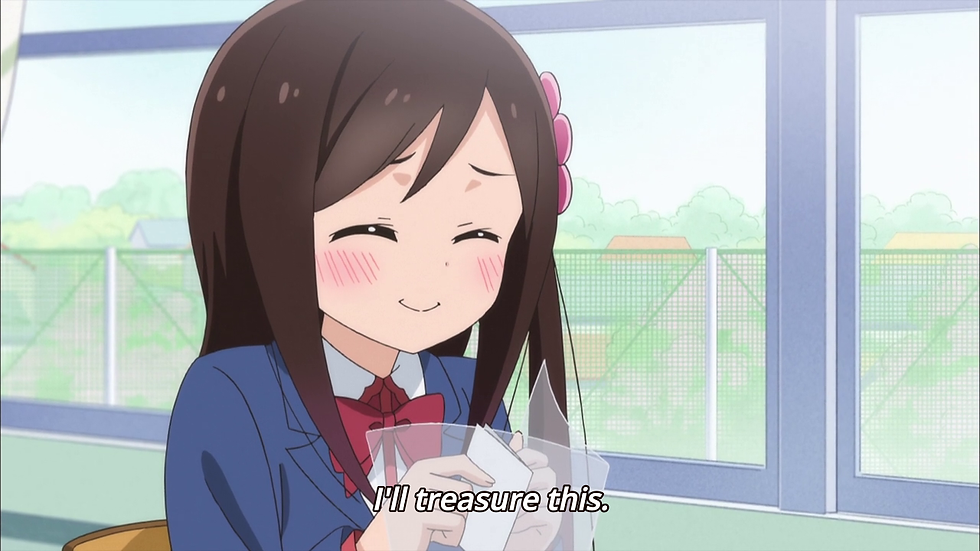
Just keep in mind that I'm already a fan of moe in general so
what works for me might still be boring to some.
To put it simply, Hitoribocchi is a series I can get behind because I understand and empathize with the plight of its main character, Hitori Bocchi. Even though my battles with social anxiety have never come close to what Hitori deals with, the simple fact that I "know that feel" makes it a lot easier for me to get invested in what she and the rest of the cast have to bring to the table. For example, though I've never been personally challenged to make friends with my entire class, I understand Hitori's emotional ups and downs of wanting to make that dream a reality and the frustration of knowing that I'm just not mentally equipped to even attempt such a feat. Even if most of Hitori's struggles throughout the series have a comedic tilt to them, the mental gymnastics she goes through to reaffirm her inferiority complex are something immediately recognizable for a lot of people. After all, acclimating to a new environment is something a lot of people have had to deal with and Hitori's actions and reactions sell this series as being representative of the introvert's experience.
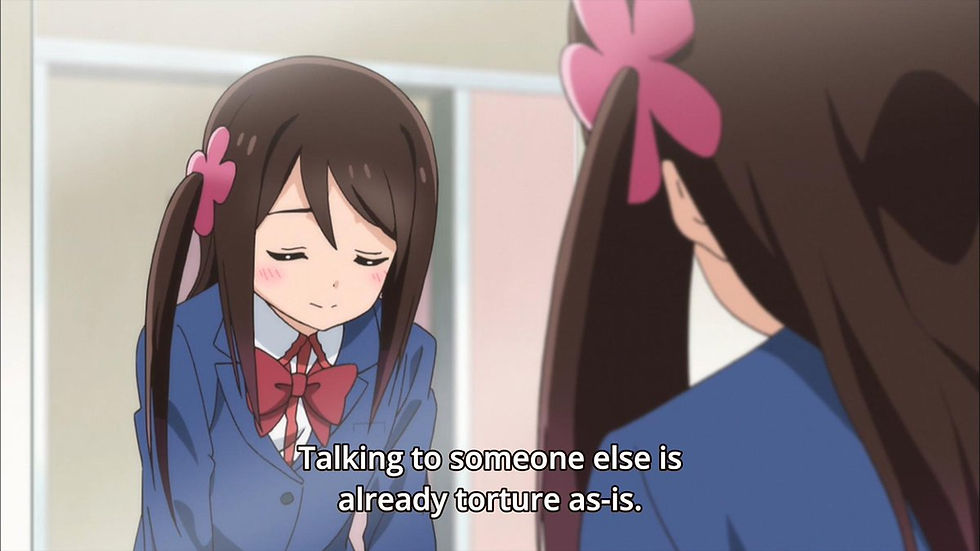
Put another way, this show is pretty much just "#2real4meirl" the anime.
Yet, the thing that really sells this series for me as something special, is the tone it uses to express the reality of Hitori's problems. Though it plays things up for the comedy more often than not, the series never goes so far as to make Hitori's life a joke in of itself. Rather, it actively goes out of its way to reinforce the fact that Hitori's struggles are not cute or funny. We, as the audience, might get a laugh at her expense but the way Hitori agonizes over her shortcomings and the way her friends have to work around her fears and anxiety make it clear that her problems are exactly that--problems. So, while the series might throw Hitori into a tough situation for some easy schadenfreude, the ultimate goal behind each and every one of these moments is to slowly but steadily help her grow into a more confident and competent person. Her progress might be slow to the point of being subtle but her gradual transformation is there. After all, at the start of the series, she could hardly bring herself to even be around other people, let alone speak to someone. By the series' end, though, we can see she's grown enough to reach out and talk with other people on her own initiative.
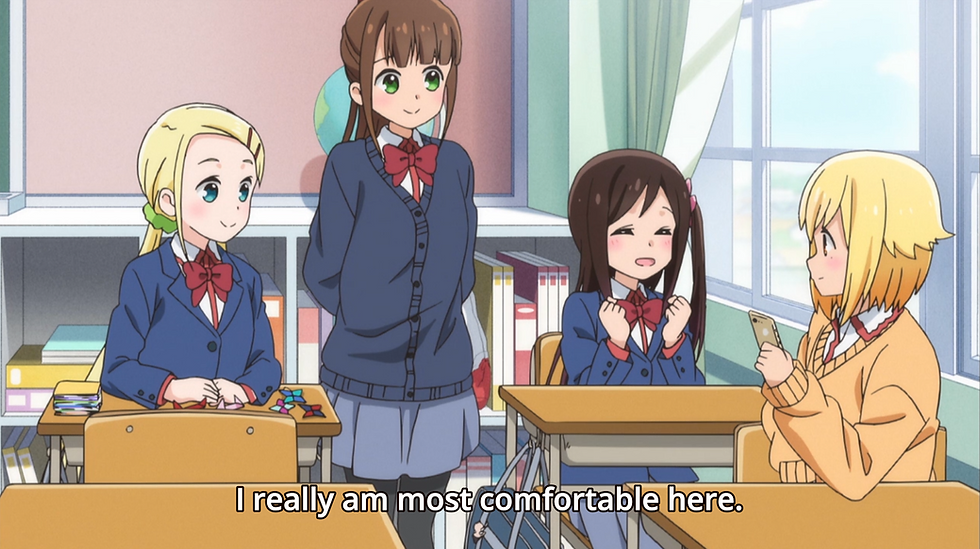
It should go without saying, though, that she needed some help to get that far.
Thankfully, the show seems to be fully aware that just watching Hitori's particular brand of social difficulty might get dull or depressing after a while. In the interest of keeping things fresh and adding variety to the comedy, the rest of the cast is given plenty of moments to shine and showcase their own social flaws. For example, the first friend Hitori makes in high school, Sunao Nako, struggles to deal with people assuming she's some kind of delinquent when, in reality, she's just an honest, easygoing kid. Often coming off as aloof or even threatening, she regularly deals with people avoiding out outright fearing her, instantly making her an outsider in most social situations. Rather than trying to deal with it like Hitori does, though, Nako simply accepts her situation and ignores the looks and mutterings of her classmates in the interest of making her life as easygoing as possible. That is, of course, until Hitori stumbles into her life and encourages Nako to come out of her shell. Obviously seeing some of her own social problems in the friendless Hitori, the two become the kind of close friends who understand and support one another as they both work to improve.
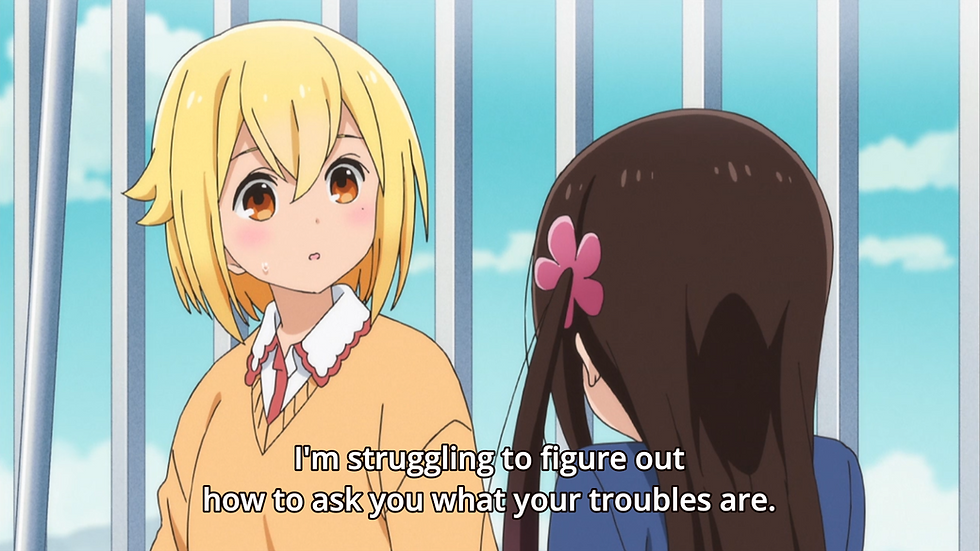
The honest and earnest way these two approach friendship is just as cute as it is encouraging.
For her part, Hitori's second friend, Honshou Aru, turns Nako's struggle on its head as she actively tries to act like someone she isn't to become more popular. Specifically, Aru struggles to compensate for and conceal her "unfortunate," clumsy nature with a cheery and energetic persona that is meant to make people believe she's dependable. In doing this, though, she wholly fails to recognize that she's always been the kind and dependable person she wants to be. After all, though she might see some of her own weakness in Hitori, Aru goes out of her way to cheer for the reigning clumsy queen through all her accidents and missteps, ensuring her that little mistakes here and there won't stop someone from being her friend. Hypocritical as her encouragement might be, though, Aru's very human refusal to practice what she preaches makes her character all the more believable and compelling. Add that kind of characterization on top of a brand of comedy equal parts absurdist and cringy and you've got an all-around great character.
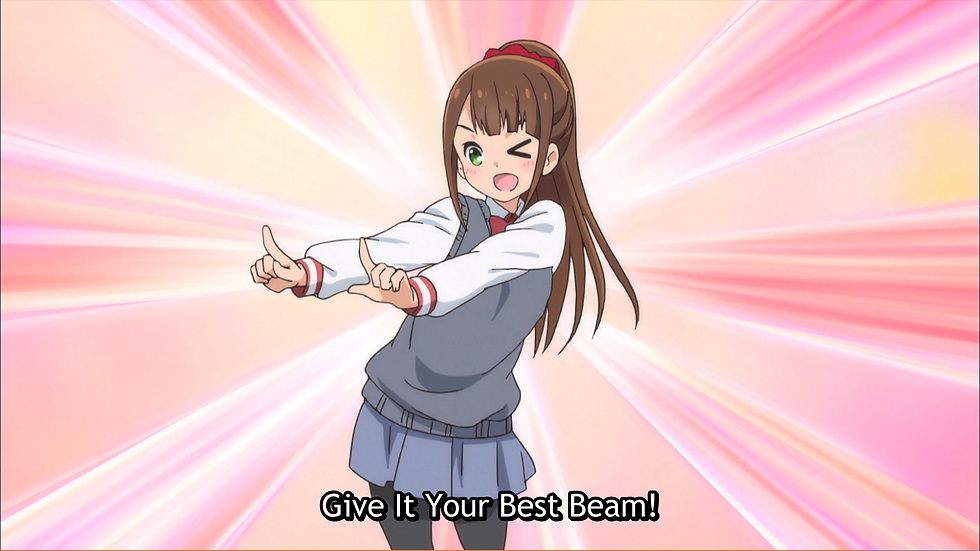
In honesty, Aru is just kinda the best, most meme-able part of this series.
With the introduction of Hitori's third friend, Sotoka Rakita, we are given yet another perspective on the ways people can struggle socially that strikes a balance between Aru's outward silliness and Hitori's inward insecurity. Specifically, the way Sotoka starts the show off as your standard air-headed foreigner plays her off as yet another socially competent extrovert. Yet, like with Aru, this quirky and dense outward persona eventually reveals itself to be little more than a means to distract herself from how lonely she feels in this foreign land. Lacking any real social skills, though, she instead dives headlong into an obsession with ninjas that would, ideally, make her stand out more and seem more approachable. Yet, while that tactic does eventually work to draw Hitori, Nako, and Aru to her, it instantly becomes an impediment once she's actually made friends. Inwardly fearful that Hitori might not actually want to be friends with her, Sotoka opts to turn her obsession into an excuse for them to act like friends. For her, though, this kind of awkward half-friendship is preferable to the potential risk of losing it by directly asking Hitori to be her friend--even though there's a 99% chance that Hitori will, in fact, say yes. For any socially awkward outsider, that %1 and fears of "what if" are more than enough to justify that kind of self-abuse. So, once again, we get a fairly well-thought-out character full of flaws and a brand of comedy that speaks to real social problems people can face.
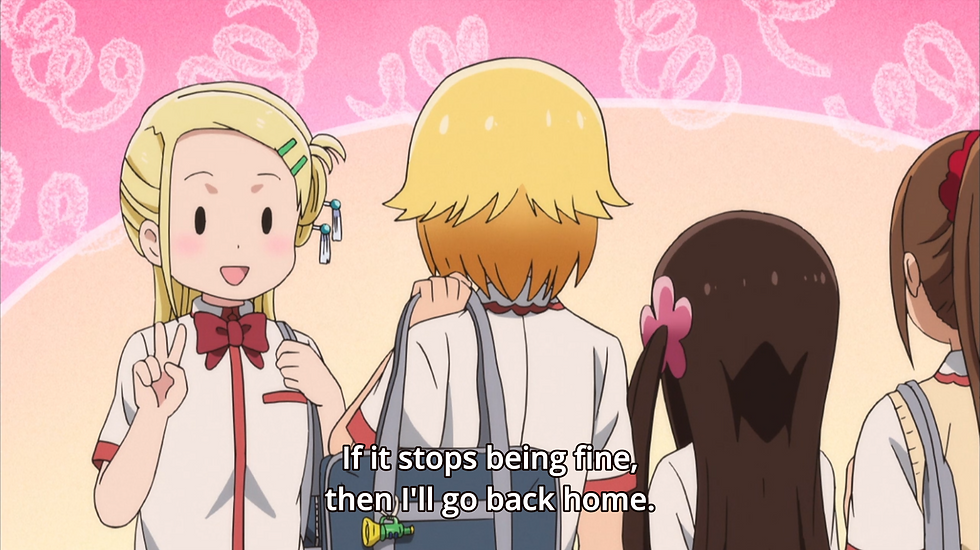
The few moments we get to see the "real" Sotoka are both heartbreaking and precious.
Lastly, as if to cement just how great this show is with its use of characters, the last "friend" Hitori makes actually serves as a real sticking point for Hitori's growth in that this character is meant to be Hitori's polar opposite. Rather than desperately looking to make friends and get along with others, Kurai Kako insists on the idea that having friends makes people weak. Though the origin of this belief doesn't get covered in the series--the best we get is a simple desire to be independent--it resolves into a stubborn excuse for her to not officially be friends with Hitori. Poorly fleshed out and tsundere as her rationale is, though, Kurai's mentality still makes for an interesting dilemma. Namely, what is Hitori supposed to do if she can't keep her promise to Kai and become friends with everyone in her class? This, then, introduces the real possibility and fact that not everyone wants friends. Whether that mentality is born of a past tragedy, a personal code, or a simple disinterest in the idea, the reality is that some people just don't get along and have no desire to bridge that gap. The show obviously paints this as a matter that'll eventually be resolved once Kurai caves to make Hitori and exception but it still adds some drama that speaks well of the series' overall dedication to capturing various forms of social anxiety and how people deal with them
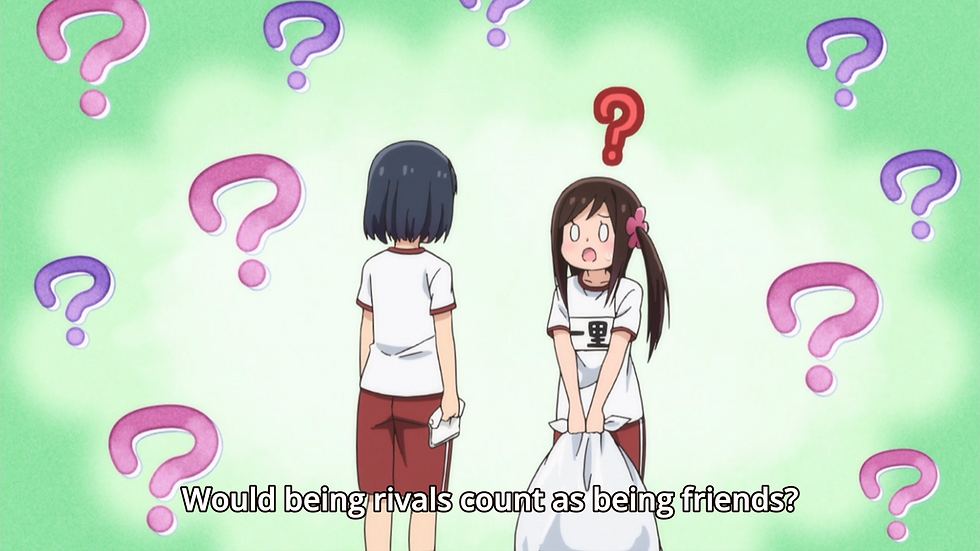
In most any other anime, the answer to that question would be a definite "yes."
.
Contrived and as Hitoribocchi's drama might be, thanks to Kai's unreasonably cruel but arguably necessary demand, I can't help feeling it did a wonderful job with its general premise. Using a variety of characters with similar but disconnected social hangups, it managed to offer a funny story full of thought and consideration. What's more, it used that narrative throughline to craft some absolutely wonderful characters that are a cut above your average moeblob. While it might still be a saccharine snooze-fest for some, this was easily the most compelling and grounded moe title I've seen in a while. If you have any taste for this particular genre, I wholeheartedly recommend it. Even if you aren't a fan but struggle with your own, unique brand of social anxiety, though, this might be the show that at least makes you understand why so many people love this cutesy, laid-back genre.


Comments